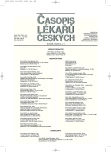-
Medical journals
- Career
Prediction of postoperative complications and optimization of surgical technique
Authors: Lubomír Martínek 1; Pavel Jahoda 2; Igor Guňka 1
Authors‘ workplace: FN Ostrava, Chirurgická klinika 1; Fakulta elektrotechniky a informatiky VŠB TU Ostrava, Katedra aplikované matematiky 2
Published in: Čas. Lék. čes. 2010; 149: 125-128
Category: Original Article
Overview
Background.
Potential benefits and risks of new operation techniques can show up differently in the individual patients. The aim of this pilot study was to verify on the basis of reliable prediction of postoperative complications the possibility to create model for optimization of the operation technique in the cohort of patients operated for rectal carcinoma.Material and methods.
The study involved patients operated in the course of five years for rectal carcinoma by means of laparoscopic or open technique. The mathematical models of prediction of postoperative complications of individual operative techniques were derived from the Physiological and Operative Severity Score for enUmeration of Mortality and Morbidity scoring system (POSSUM). The reliability of prediction for the given technique was tested and the patients of the cohort were analyzed with regard to the “suitability” of the operation technique used.Results.
The study involved 91 patients operated using open technique and 67 patients operated laparoscopically with the occurrence of 45% and 39% of the postoperative complications respectively. The statistically relevant variables tested for the occurrence of postoperative complications were the “cardiac symptoms” and “severity of the surgery” for open operations, and “leukocytes” and “severity of the surgery” for the laparoscopic operations. The prediction models based on these variables showed statistically high reliability. The complications in the entire cohort would in case of ideal selection of surgical technique drop by 36%.Conclusion.
Reliable prediction of the postoperative complications can be potentially effective tool to optimize surgical treatment for an individual patient.Key words:
POSSUM, postoperative complications, risk factors, prediction, operating technique.
Sources
1. Copeland GP, Jones D, Wakters M. POSSUM: a scoring system for surgical audit. Br J Surg 1991; 78 : 356–360.
2. Tekkis PP, Prytherch DR, Kocher HM, et al. Development of a dedicated risk-adjusted scoring system for colorectal surgery (colorectal POSSUM). Br J Surg 2004; 91 : 1174–1182.
3. Whiteley MS, Prytherch DR, Higgins B, et al. An evaluation of the POSSUM surgical scoring system. Br J Surg 1996; 83 : 812–815.
4. Midwinter MJ, Tytherleigh M, Ashley S. Estimation of mortality and morbidity risk in vascular surgery using POSSUM and the Portsmouth predictor equation. Br J Surg 1999; 86 : 471–474.
5. Uddin FJ, Burke D. The use of POSSUM scores for morbidity and mortality in colorectal cancer. Br J Surg 2003; 90 (Suppl. 1): 84.
6. Law WL, Lam CM, Lee YM. Evaluation of outcome of laparoscopic colorectal resection with POSSUM, Portsmouth POSSUM and colorectal POSSUM. Br J Surg 2005; 93 : 94–99.
7. Brunelli A, Fianchini A, Xiume F, et al. Evaluation of the POSSUM scoring system in lung surgery. Thorac Cardiovasc Surg 1998; 46 : 141–146.
8. Lam CM, Fan ST, Yuen AW, et al. Validation of POSSUM scoring systems for audit of major hepatectomy. Br J Surg 2004; 91 : 450–454.
9. Martínek L, Dostalík J, Vávra P, a kol. Implementace skórovacího systému POSSUM pro objektivizaci morbidity laparoskopických operací kolorekta. Rozhl Chir 2008; 87 : 26–31.
10. Prytherch DR, Whiteley MS, Higgins B, et al. POSSUM and Portsmouth POSSUM for predicting mortality. Physiological and operative severity score for the enumeration of mortality and morbidity. Br J Surg 1998; 85 : 1217–1220.
11. Frasson M, Braga M, Vignali A, Zuliani W, Di Carlo V. Benefits of laparoscopic colorectal resection are more pronounced in elderly patients. Dis Colon Rectum 2008; 51 : 296–300.
12. Stocchi L, Nelson H, Young-Fadok TM, Larson DR, Ilstrup DM. Safety and advantages of laparoscopic vs. open colectomy in the elderly: matched-control study. Dis Colon Rectum 2000; 43 : 326–332.
13. Person B, Cera SM, Sands DR, Weiss EG, Vernava AM, Nogueras JJ, Wexner SD. Do elderly patients benefit from laparoscopic colorectal surgery? Surg Endosc 2008; 22 : 401–405.
Labels
Addictology Allergology and clinical immunology Angiology Audiology Clinical biochemistry Dermatology & STDs Paediatric gastroenterology Paediatric surgery Paediatric cardiology Paediatric neurology Paediatric ENT Paediatric psychiatry Paediatric rheumatology Diabetology Pharmacy Vascular surgery Pain management Dental Hygienist
Article was published inJournal of Czech Physicians

-
All articles in this issue
- New options of influenza vaccination
- Urologic complications of HIV infection
- Adrenocortical insufficiency and diabetes mellitus type 1
- Impact of mechanical circulatory support on renal function in a patient with end stage heart failure
- Prediction of postoperative complications and optimization of surgical technique
- The Year of the Lung
- Practical instrument for pathological gamblers and other patients with heavy debts
- Journal of Czech Physicians
- Journal archive
- Current issue
- Online only
- About the journal
Most read in this issue- Adrenocortical insufficiency and diabetes mellitus type 1
- New options of influenza vaccination
- Urologic complications of HIV infection
- Impact of mechanical circulatory support on renal function in a patient with end stage heart failure
Login#ADS_BOTTOM_SCRIPTS#Forgotten passwordEnter the email address that you registered with. We will send you instructions on how to set a new password.
- Career

